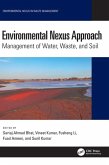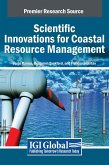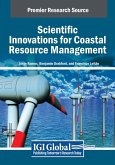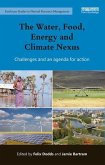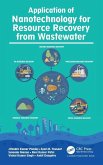Environmental Nexus for Resource Management
Herausgeber: Jatav, Hanuman Singh; Singh, Satish Kumar; Minkina, Tatiana
Environmental Nexus for Resource Management
Herausgeber: Jatav, Hanuman Singh; Singh, Satish Kumar; Minkina, Tatiana
- Gebundenes Buch
- Merkliste
- Auf die Merkliste
- Bewerten Bewerten
- Teilen
- Produkt teilen
- Produkterinnerung
- Produkterinnerung
This book gives detailed information about how soil, water and wastes can be managed to overcome the various global issues via possible nexus thinking. The emphasis is on the environmental resource perspective of the global climate change related issues.
Andere Kunden interessierten sich auch für
![Environmental Nexus Approach Environmental Nexus Approach]() Environmental Nexus Approach178,99 €
Environmental Nexus Approach178,99 €![The MEMS and Nano Nexus The MEMS and Nano Nexus]() Marshall BanksThe MEMS and Nano Nexus24,99 €
Marshall BanksThe MEMS and Nano Nexus24,99 €![Scientific Innovations for Coastal Resource Management Scientific Innovations for Coastal Resource Management]() Scientific Innovations for Coastal Resource Management250,99 €
Scientific Innovations for Coastal Resource Management250,99 €![Scientific Innovations for Coastal Resource Management Scientific Innovations for Coastal Resource Management]() Scientific Innovations for Coastal Resource Management192,99 €
Scientific Innovations for Coastal Resource Management192,99 €![The Water, Food, Energy and Climate Nexus The Water, Food, Energy and Climate Nexus]() The Water, Food, Energy and Climate Nexus75,99 €
The Water, Food, Energy and Climate Nexus75,99 €![Moral Freedom Moral Freedom]() Nicolai HartmannMoral Freedom109,95 €
Nicolai HartmannMoral Freedom109,95 €![Application of Nanotechnology for Resource Recovery from Wastewater Application of Nanotechnology for Resource Recovery from Wastewater]() Application of Nanotechnology for Resource Recovery from Wastewater222,99 €
Application of Nanotechnology for Resource Recovery from Wastewater222,99 €-
-
-
This book gives detailed information about how soil, water and wastes can be managed to overcome the various global issues via possible nexus thinking. The emphasis is on the environmental resource perspective of the global climate change related issues.
Produktdetails
- Produktdetails
- Verlag: CRC Press
- Seitenzahl: 418
- Erscheinungstermin: 5. August 2024
- Englisch
- Abmessung: 240mm x 161mm x 27mm
- Gewicht: 790g
- ISBN-13: 9781032414539
- ISBN-10: 1032414537
- Artikelnr.: 70151526
- Herstellerkennzeichnung
- Libri GmbH
- Europaallee 1
- 36244 Bad Hersfeld
- gpsr@libri.de
- Verlag: CRC Press
- Seitenzahl: 418
- Erscheinungstermin: 5. August 2024
- Englisch
- Abmessung: 240mm x 161mm x 27mm
- Gewicht: 790g
- ISBN-13: 9781032414539
- ISBN-10: 1032414537
- Artikelnr.: 70151526
- Herstellerkennzeichnung
- Libri GmbH
- Europaallee 1
- 36244 Bad Hersfeld
- gpsr@libri.de
Hanuman Singh Jatav is an Assistant Professor in the Department of Soil science and Agricultural Chemistry, Sri Karan Narendra Agriculture University, Jobner Jaipur (Rajasthan), India. He has completed his M.Sc. (Ag.) and Ph.D. from Department of Soil Science and Agricultural Chemistry, Institute of Agricultural Sciences, Banaras Hindu University, Varanasi, Uttar Pradesh, India. He has been awarded a Certificate of Gratitude as an Ambassador by IUCN: International Union for Conservation of Nature- Gland, Switzerland (https://www.iucn.org/) in the World Conservation Congress during Global Youth Summit. Considering his work he has been also awarded Outstanding Assistant Professor of the Sri Karan Narendra Agriculture University, Jobner Jaipur (Rajasthan) India. Tatiana Minkinais the Head of Soil Science and Land Evaluation Department of Southern Federal University, Russia. Satish Kumar Singh started his professional career in 1990 as Lecturer of Agricultural Chemistry in Amar Singh (PG) College, Lakhaoti, Bulandshahr. Subsequently, he joined as Associate Professor G.B. Pant University of Agriculture and Technology, Pantnagar (Uttarakhand) in 1999 and as Professor at Banaras Hindu University, Varanasi in 2006. Prof. Singh is Fellow of Indian Society of Soil Science, New Delhi and Indian Society of Agricultural Chemists, Allahabad. Bijay Singh, a soil chemist by training and one of the ten National Professors of the Indian Council of Agricultural Research during 2006 to 2012, is presently associated with Punjab Agricultural University, Ludhiana (Punjab, India) as INSA Honorary Scientist. Vishnu D. Rajput is working as a Leading Researcher (Associate Professor), Head of 'Soil Health Lab' at Southern Federal University, Rostov-on-Don, Russia.
1. Management of Soil, Waste and Water in the Context of Global Climate
Change. 2. Potential Eco-Friendly Techniques for Water, Soil, and Waste
Management. 3. Potential Role of Healthy Soil for Global Environment. 4.
Soil Based Implication Approach for Environmental Nexus. 5. Soil Security
to Address Potential Global Issues. 6. Making the Water-Soil-Waste Nexus
Wor: Framing the Boundries of Resource Flows. 7. Nexus Approach: Resource
Management for Soil Productivity. 8. Climate Change, Profligacy, Poverty
and Destruction: All Things are Interconnected. 9. Soils' Role in Meeting
Global Demand for Food, Water and Bioenergy. 10. The Nexus between
Environmental Damage, Poverty, and Climate Change in Hard-To-Reach Areas: A
Somber Tale of the Twenty-First Century. 11. Urban Soil Management for
Improved Resource-Efficiency of Developing Cities. 12. Potential Nexus
Approach for Sustainable Soil Productivity Resource Management. 13. The
Ecosystem Approach and Environmental Justice Nexus in Natural Resource. 14.
Soil: A Potential Source for Mitigating Food, Water and Bio-Energy Crisis.
15. Role of Soils for Satisfying Global Demands for Food, Water and
Bioenergy. 16. Agriculture, Rural Poverty and Natural Resource Management
in Less Favored Environments: Revisiting Challenges and Conceptual Issues.
17. Environmental Resource Management with Reference to Global Climate
Change. 18. Management of Urban Polluted Soil to Enhance Resource Use
Efficiency in Developing Cities. 19. Engineered Nanoparticles for Plant
Originated Environmental Consequence
Change. 2. Potential Eco-Friendly Techniques for Water, Soil, and Waste
Management. 3. Potential Role of Healthy Soil for Global Environment. 4.
Soil Based Implication Approach for Environmental Nexus. 5. Soil Security
to Address Potential Global Issues. 6. Making the Water-Soil-Waste Nexus
Wor: Framing the Boundries of Resource Flows. 7. Nexus Approach: Resource
Management for Soil Productivity. 8. Climate Change, Profligacy, Poverty
and Destruction: All Things are Interconnected. 9. Soils' Role in Meeting
Global Demand for Food, Water and Bioenergy. 10. The Nexus between
Environmental Damage, Poverty, and Climate Change in Hard-To-Reach Areas: A
Somber Tale of the Twenty-First Century. 11. Urban Soil Management for
Improved Resource-Efficiency of Developing Cities. 12. Potential Nexus
Approach for Sustainable Soil Productivity Resource Management. 13. The
Ecosystem Approach and Environmental Justice Nexus in Natural Resource. 14.
Soil: A Potential Source for Mitigating Food, Water and Bio-Energy Crisis.
15. Role of Soils for Satisfying Global Demands for Food, Water and
Bioenergy. 16. Agriculture, Rural Poverty and Natural Resource Management
in Less Favored Environments: Revisiting Challenges and Conceptual Issues.
17. Environmental Resource Management with Reference to Global Climate
Change. 18. Management of Urban Polluted Soil to Enhance Resource Use
Efficiency in Developing Cities. 19. Engineered Nanoparticles for Plant
Originated Environmental Consequence
1. Management of Soil, Waste and Water in the Context of Global Climate
Change. 2. Potential Eco-Friendly Techniques for Water, Soil, and Waste
Management. 3. Potential Role of Healthy Soil for Global Environment. 4.
Soil Based Implication Approach for Environmental Nexus. 5. Soil Security
to Address Potential Global Issues. 6. Making the Water-Soil-Waste Nexus
Wor: Framing the Boundries of Resource Flows. 7. Nexus Approach: Resource
Management for Soil Productivity. 8. Climate Change, Profligacy, Poverty
and Destruction: All Things are Interconnected. 9. Soils' Role in Meeting
Global Demand for Food, Water and Bioenergy. 10. The Nexus between
Environmental Damage, Poverty, and Climate Change in Hard-To-Reach Areas: A
Somber Tale of the Twenty-First Century. 11. Urban Soil Management for
Improved Resource-Efficiency of Developing Cities. 12. Potential Nexus
Approach for Sustainable Soil Productivity Resource Management. 13. The
Ecosystem Approach and Environmental Justice Nexus in Natural Resource. 14.
Soil: A Potential Source for Mitigating Food, Water and Bio-Energy Crisis.
15. Role of Soils for Satisfying Global Demands for Food, Water and
Bioenergy. 16. Agriculture, Rural Poverty and Natural Resource Management
in Less Favored Environments: Revisiting Challenges and Conceptual Issues.
17. Environmental Resource Management with Reference to Global Climate
Change. 18. Management of Urban Polluted Soil to Enhance Resource Use
Efficiency in Developing Cities. 19. Engineered Nanoparticles for Plant
Originated Environmental Consequence
Change. 2. Potential Eco-Friendly Techniques for Water, Soil, and Waste
Management. 3. Potential Role of Healthy Soil for Global Environment. 4.
Soil Based Implication Approach for Environmental Nexus. 5. Soil Security
to Address Potential Global Issues. 6. Making the Water-Soil-Waste Nexus
Wor: Framing the Boundries of Resource Flows. 7. Nexus Approach: Resource
Management for Soil Productivity. 8. Climate Change, Profligacy, Poverty
and Destruction: All Things are Interconnected. 9. Soils' Role in Meeting
Global Demand for Food, Water and Bioenergy. 10. The Nexus between
Environmental Damage, Poverty, and Climate Change in Hard-To-Reach Areas: A
Somber Tale of the Twenty-First Century. 11. Urban Soil Management for
Improved Resource-Efficiency of Developing Cities. 12. Potential Nexus
Approach for Sustainable Soil Productivity Resource Management. 13. The
Ecosystem Approach and Environmental Justice Nexus in Natural Resource. 14.
Soil: A Potential Source for Mitigating Food, Water and Bio-Energy Crisis.
15. Role of Soils for Satisfying Global Demands for Food, Water and
Bioenergy. 16. Agriculture, Rural Poverty and Natural Resource Management
in Less Favored Environments: Revisiting Challenges and Conceptual Issues.
17. Environmental Resource Management with Reference to Global Climate
Change. 18. Management of Urban Polluted Soil to Enhance Resource Use
Efficiency in Developing Cities. 19. Engineered Nanoparticles for Plant
Originated Environmental Consequence



